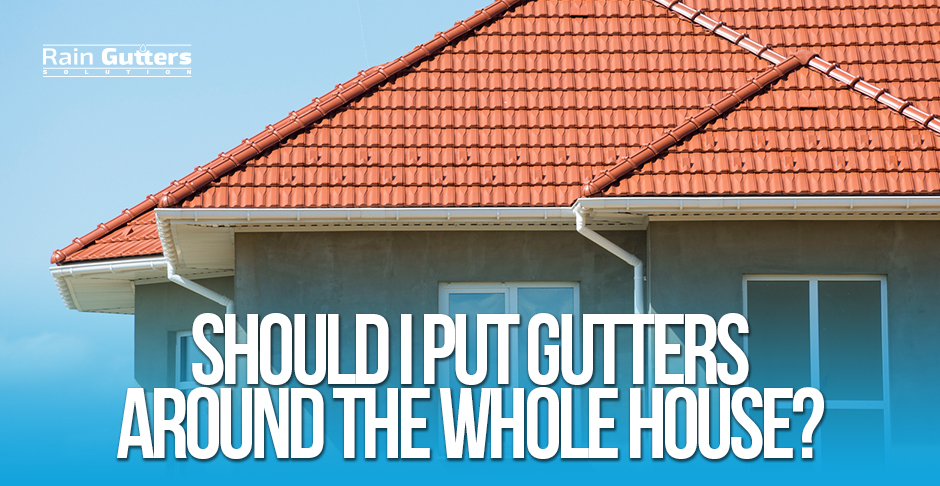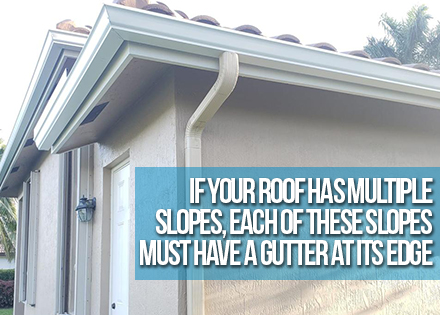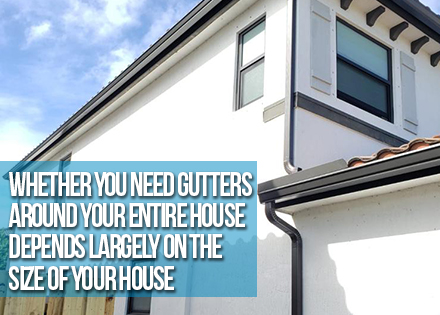Should I Put Gutters Around the Whole House?
August 03, 2022

Residential gutters are a common asset that's part of most modern houses. They're meant to prevent the accumulation of water around a home's foundations, countering many related problems like rotting, flooding, and pests. Ideally, they're built by a
Rain Gutter Installation Service that defines the gutter's location beforehand. A residential gutter should be attached to the downspout and ultimately connect to the outer drainage system, but there are additional details to keep in mind.
Why Install Rain Gutters for My House?
While it's true that a rain guttering system isn't essential in some cases (in a dry climate, roofs with a large overhang, homes that sit higher than their surroundings), it brings many benefits that help preserve a home's structure and its value in the market. When it comes to the climate in South Florida, rain gutters represent an important asset to prevent damage during the rainy season, which can sometimes span six months of constant storms.
Here are the main benefits of having a residential rain gutter:
- They protect your foundations and sidings: This is probably the most well-known advantage of having a rain gutter. The foundation damage caused by moisture buildup can easily compromise a construction in ways that only a wide-range repair job can fix. In addition, rotted foundations and sidings affect your home's esthetic value and prompt the spread of mold, mildew, and pests.
By redirecting all the rainwater falling around the house during a storm, your gutters help preserve its foundations through the years. In addition, professional gutters can be customized so they won't affect your home's appearance, to the point that they add to the property's market value.

- They protect your soil from erosion: Rain gutters redirect all the rainwater falling around your home to a disposal area far away from the property. Without a rain guttering system in place, the water seeps into your soil and settles on your garden bed, ultimately affecting the vegetation that grows from it. A rain guttering system is key to preserve the beauty of your landscaping.
- They prevent damage on your roof: When they're properly installed, rain gutters help prevent the accumulation of water beneath the roof structure, reducing the chances of leaks and shingles particles falling off the roof.
- They help preserve your home's hygienic conditions: Because they stop the growth of mold and pest infestations, rain gutters help homeowners in their efforts to keep a hygienic space for families and guests. Mold and mildew can onset a host of health issues ranging from allergies to exhaustion, dizziness, and irritation in multiple parts of the body. This is why it's so important to keep any dampness at bay before it seeps into your property.
- They prevent floods on your basement: There's something obviously missing when you risk water getting into your basement during every storm., Basements are among the most affected areas during the rainy season, with rainwater making its way from the home's crawl space and even flooding the basement when there's nothing stopping the water flow.
Your rain gutters keep the water off the foundations, so it has no chance to seeping into the basement or any other part of your house.
Installing Residential Gutters – Where Should I Put My Rain Gutters?
Your home's guttering system should include a gutter section which, in turn, meets the downspout. The gutter section runs horizontally along the roof's edge, supported by hangers that usually stand on the fascia and hold the gutter from behind. When it comes to gutter styles, k-style gutters and half-round gutters are the most popular choices among homeowners since they can hold enough water without looking out of place as part of a house's façade.

Household gutters don't have to be as big as commercial gutters, in which the standard width can be of 7 and even 8 inches. In most cases, a residential gutter has 5 or 6 inches of width and around 20 feet in length. This all depends on the size of the house, and contractors recommend keeping no more than 50 feet of length between each downspout to avoid weighing down the gutter.
In most cases, a house does well with a gutter that only runs through parts of the building rather than circling all the sides. This is because many modern homes have a gable roof, so they only need gutters below the slopes. If your home happens to have a hip roof (slopes on all sides), you need to install gutters around the whole house. In short, you should have a gutter running at the bottom of any slope, including any roofing framing the windowsills or the house's main entrance.
It's normal for commercial buildings and other public facilities to have a gutter on all sides because of the sheer size of their structure. Some of these buildings have a flat roof equipped with a membrane that keeps the water away from the foundations, but even flat roofs can benefit from gutters. In these cases, a rain gutter can stop the water from pooling on the roof itself, deteriorating its structure later on.
If you're planning to install a new rain gutter and don't know how to go about it, you can count on Rain Gutters Solution. For decades, we have installed the most durable gutters for homes and businesses, adapting our skills and equipment to the needs of each structure. Feel free to reach out to us if you have questions about our installation services or if you want to schedule an appointment with our specialists. Just call
(305) 270-7779 or fill out the
contact form to schedule an appointment with us.
If you found this article helpful then let us know in the comments section below. Likewise, feel free to share it using the share options below. Want us to cover another topic of your interest pertaining to rain gutters? If so, then like us and follow us on social media, and post to any of our social media profiles the topic you'd like us to discuss:
Facebook @RainGuttersSolution,
Twitter @Gutterssolution and
Instagram @RainGuttersSolution


 Household gutters don't have to be as big as commercial gutters, in which the standard width can be of 7 and even 8 inches. In most cases, a residential gutter has 5 or 6 inches of width and around 20 feet in length. This all depends on the size of the house, and contractors recommend keeping no more than 50 feet of length between each downspout to avoid weighing down the gutter.
Household gutters don't have to be as big as commercial gutters, in which the standard width can be of 7 and even 8 inches. In most cases, a residential gutter has 5 or 6 inches of width and around 20 feet in length. This all depends on the size of the house, and contractors recommend keeping no more than 50 feet of length between each downspout to avoid weighing down the gutter.